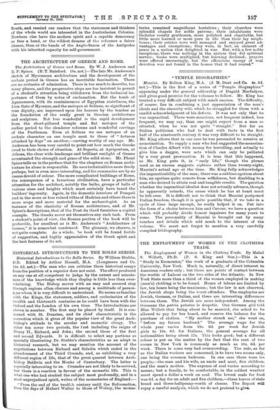THE EMPLOYMENT OF WOMEN IN THE CLOTHING TRADE.
The Employment of Women in the Clothing Trade. By Mabel S. Willett, Ph.D. (P. S. King and Son.)—This is a "Study in Economies," the work of a graduate of the Columbia University, New York. Much is, naturally, of direct interest to American readers only ; but there are points of contact between the worlds of Labour on the two sides of the Atlantic. In New York State more than a third of the women employed in making (men's) clothing is to be found. Hours of labour are limited by law, ten hours being the maximum ; but the law is not observed, the Jewish shops being the worst offenders. The employees are Jewish, German, or Italian, and there are interesting differences between them. The Jewish are more independent. Among -the Germans the patria potestas is despotic. One German girl told Miss Willett that being about to be married, she asked to be allowed to pay for her board, and reserve the balance for the purchase of clothes. "My mother struck me," she went on, "before my future husband." The average wage for the whole year varies from 18s. 6d. per week for Jewish girls to 13s. 6d. for Italians, the general average for• all nationalities being about 17s. This looks good; but a different colour is put on the matter by the fact that the rent of two rooms in New York is commonly as much as 10s. 6d. per week. There is some very bad overcrowding. The rule, as far as the Italian workers are concerned, is to have two rooms only, one being the common bedroom. In one case there were ten people,—the man and his wife, an uncle and aunt, five children, and the man's mother. The expense of coal varies according to means; but a family, to be comfortable, in the coldest weather must spend a dollar a week on coal. The lowest scale for food was 6d. a day for an adult and five children,—three loaves of stale bread and three-halfpenny-worth of cheese. The Report will repay a careful analysis, which we do not pretend to give.






















































 Previous page
Previous page